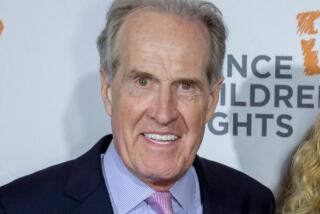Allied Bombing Raids Taking Heavy Civilian Toll in Basra, Clark Asserts : Damage: The anti-war former attorney general also claims that he saw no military targets being hit.
- Share via
WASHINGTON — Former U.S. Atty. Gen. Ramsey Clark, who drew fire for past trips to North Vietnam, Iran, Libya and El Salvador on behalf of leftist causes, tempted controversy once again Thursday by alleging extensive civilian damage after a tour of bomb-ravaged Basra, Iraq.
“The civilian casualties there are very heavy,” Clark said in a Cable News Network interview in Baghdad, detailing destruction he had seen in Basra. “You saw no military materiel being hit at all.”
Clark said 46 civilians were killed and about 100 injured at a low-cost housing development struck by allied bombers. Other damaged facilities in Basra include a high school, elementary school, mosque, “family club,” nightclub, hospital and other houses, he said.
Clark brushed aside a question about whether he had seen any military installations in Basra, which U.S. officials say is the headquarters for Iraqi military operations in southern Iraq and Kuwait.
“I said that crisscrossing the town, I saw no military materiel hit. You ought to listen. Then you’d be able to ask a better question,” he snapped.
A persistent defender of the Palestine Liberation Organization, the 62-year-old lawyer and human rights activist has been an outspoken loner on the left ever since serving as former President Lyndon B. Johnson’s top legal officer in 1967-68.
He has generated international headlines for trips to various hot spots, starting with one in 1972 that was strikingly similar to his personal journey this week to Iraq.
While U.S. bombers were pounding North Vietnam, the tall, jut-jawed Texas native traveled to Hanoi and blasted America’s conduct of the war.
Eight years later, Clark infuriated then-President Jimmy Carter by flying to Tehran, criticizing American support for the dethroned Shah. Carter, charging that Clark’s comments jeopardized American hostages, threatened to prosecute him for traveling to Iran in violation of a presidential ban.
“The irony is apparent in a former attorney general attending a conference to prove the criminality of his own nation,” Carter said.
Clark also stirred controversy with a 1986 trip to Libya, voicing outrage over an attack by U.S. jets three months earlier. At a meeting with Libyan dictator Moammar Kadafi, he called the bombing a violation of international law.
In 1989, Clark flew to El Salvador and helped win the release from prison of Jennifer Casolo, a young American religious worker accused by Salvadoran officials of stockpiling weapons for rebel troops.
Once again, Clark sparked criticism, but he also won praise from enthusiastic supporters.
“I can’t think of anyone better who could have represented me,” Casolo said last year. “He understood me, he understood the situation and he acted very strongly on my behalf. He made it clear to (Salvadoran President) Alfredo Cristiani what the consequences would be for his country if I wasn’t released.”
Another supporter was John Healey, executive director of Amnesty USA.
“Americans may not realize this, but Ramsey Clark is one of the most respected advocates for human rights in the world today,” Healey said in early 1990. “He’s probably much better known abroad than he is here. There are lots of countries where he is just as well-known as many leading American politicians.”
In an interview last year, Clark recalled that as a Marine courier in World War II, he saw firsthand the devastation of war in Europe, the Soviet Union and Asia.
He said he landed a job in the Justice Department under President John F. Kennedy with the help of then-Vice President Johnson. Years earlier, Johnson had helped Clark’s father get a similar job.
Johnson eventually made Ramsey Clark attorney general.
Although he held liberal views, he operated in the political mainstream, at one point indicting Dr. Benjamin Spock for conspiring to destroy the Selective Service system.
But after leaving the government, Clark made a hard left turn, associates said. He took on clients such as the PLO, the Berrigan brothers, suspected Arab terrorists and the Black Panthers.
Times staff writer Josh Getlin contributed to this story.
More to Read
Get the L.A. Times Politics newsletter
Deeply reported insights into legislation, politics and policy from Sacramento, Washington and beyond. In your inbox twice per week.
You may occasionally receive promotional content from the Los Angeles Times.










